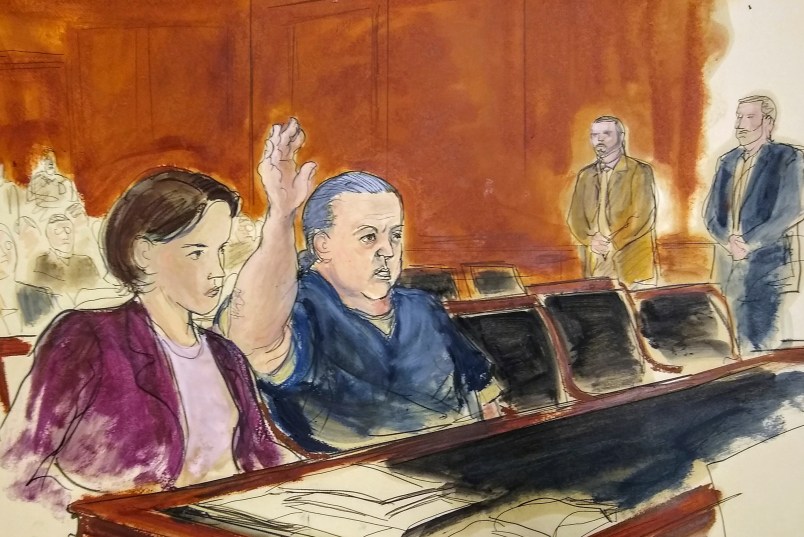The man who mailed pipe bombs to prominent Democrats and supporters of liberal causes before the 2018 midterms is a steroid-addicted sexual abuse survivor who “found light in Donald J. Trump,” federal defenders representing him say.
Attorneys for Cesar A. Sayoc are trying to convince a Manhattan federal judge to sentence the attempted bomber to 10 years 1 month behind bars, plus supervision with combined mental health and substance abuse treatment. They argue that Sayoc’s mental health issues and obsession with President Trump contributed to his radicalization and decision to send the bombs.
Sayoc caused panic across the country the month before the 2018 midterms by mailing crude pipe bombs to critics of President Trump, top Democrats, and CNN. Prosecutors are demanding that he spend life behind bars for his crimes.
In a 39-page sentencing memorandum, Sayoc’s attorneys laid out a detailed narrative of his radicalization. Sayoc went from being a steroid-addled pariah relying on self-help audiobooks and strip mall fortune-tellers to a political radical who saw it as his mission to protect Trump and the country by attacking prominent liberals across the country, according to the sentencing memo.
In a section titled “Mr. Sayoc’s political radicalization,” attorneys described how Sayoc — suffering from mental illness and working as a part-time pizza delivery man and part-time strip club DJ — found solace in self-help books on tape.
“It was from these books that he discovered Donald Trump, whose audiobooks Mr. Sayoc credits with saving his life,” the attorneys wrote. “Mr. Sayoc viewed Donald Trump as everything he wanted to be: self-made, successful, and a ‘playboy.'”
Sayoc lost his home during the 2008 financial crisis. With ongoing steroid use and the death of close family members, attorneys wrote, his mental condition continued to deteriorate.
When Trump announced his candidacy in 2015, the memo reads, Sayoc “found a calling for the first time in years.”
Having not been “especially political” before the 2016 campaign season, Sayoc “came to view Trump as a personal champion—someone who had helped him through the most difficult periods of his life and who could do the same for other people across the country.”
Sayoc got involved in the Trump campaign itself as a low-level volunteer, “passing out flyers, and covering his van in pro-Trump stickers,” his lawyers wrote in the memo. He also began to devote more time to social media, joining “hundreds of right-wing Facebook groups” which promoted “the idea that Trump’s critics were dangerous, unpatriotic, and evil” as well as “provocative language to depict Democrats as murderous, terroristic, and violent.”
“Fox News furthered these arguments,” the memo adds.
Adding to Sayoc’s descent, his attorneys argued, was his obsession with Trump’s Twitter account, where the President portrayed Sayoc’s future targets as “dangerous, corrupt, and un-American.”
“The combination of his cognitive deficiencies, steroid-induced delusional thinking, political naiveté, and his isolation resulted in Mr. Sayoc being unable to critically evaluate these claims,” the memo reads.
“He truly believed wild conspiracy theories he read on the internet, many of which vilified Democrats and spread rumors that Trump supporters were in danger because of them. He heard it from the President of the United States, a man with whom he felt he had a deep personal connection. He read it on almost every website he visited. He saw it on Fox News, which he watched at the start and end of his day. And it was reinforced to him on social media,” attorneys wrote.
Sayoc began to contemplate his failed bombing campaign in the run-up to the November 2018 midterms, seeing it as a chance to “help the country or defend it (and himself) from people who were working to do harm.”
None of the 16 bombs that Sayoc sent detonated. He was arrested on Oct. 26 before pleading guilty to 65 counts in March.
Sayoc will be sentenced by U.S. District Judge Jed Rakoff on Sept. 12. Read the defense’s filing here:







Wait, wasn’t he economically anxious?
“Mail Bomber’s Trump Obsession Contributed To Radicalization”
IANAL, but I believe the standard legal response to this would be, “No shit, Sherlock.” Although I could be wrong.
“Donald Trump radicalizes Americans into becoming extremist right wing domestic terrorists.”
Truly sad. But it’s a miracle nobody was hurt. Lawyer friends, what’s the possibility of suing the worst offenders among the conspiracy-mongers? They’re already getting people killed. This trial itself showed the causal chain.
Maybe the defense attorney should show the jury the “Second Amendment Solution” Trump proposed for Hillary:
https://www.youtube.com/watch?v=pvjGoXewcSUOf course, he probably only meant he wanted them to bake her some cookies because, after all, “Be Best!”